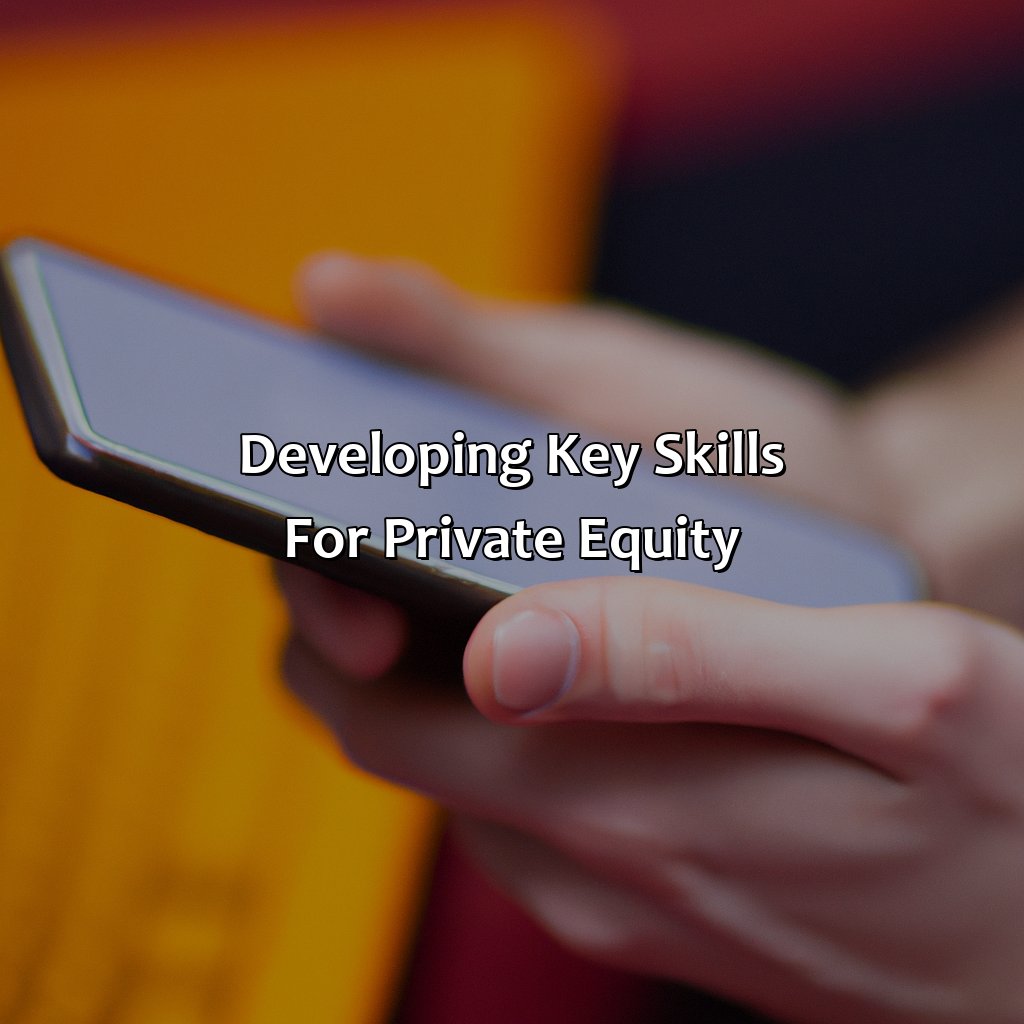How To Get Into Private Equity Without Investment Banking?
Key Takeaway:
- Alternative paths to investment banking for private equity include consulting, joining a boutique private equity firm, or working in a corporate development role. These paths can provide valuable experience and skills that are transferable to private equity.
- Developing key skills for private equity is essential, such as financial analysis and modeling, deal structuring and negotiation skills, and knowledge of industry and market trends. Gaining expertise in these areas can increase your chances of success in private equity.
- Networking and building relationships is crucial for pursuing a career in private equity. Attend conferences and industry events, utilize social media for networking, and reach out to alumni and professionals in the field to build connections and learn about potential opportunities.
Do you want to break into the lucrative career of private equity but don’t have experience in investment banking? This article will show you how to do it. You’ll learn the key skills and qualifications to secure your position in this competitive field.
Alternative Career Paths to Investment Banking for Private Equity
Want to find an alternate to investment banking for private equity? There are a few options.
- Move from consulting to private equity.
- Join a boutique private equity firm.
- Or, work in a corporate development role.
Each of these can help you break into the private equity world without going the normal investment banking route.

Image credits: retiregenz.com by Adam Washington
Moving from Consulting to Private Equity
Consulting backgrounds offer valuable skills for private equity careers. With strategic thinking and analytical abilities, consultants can thrive in PE. Networking and enhancing financial knowledge through courses or self-study can help transition to an investment role.
Developing industry-specific expertise is essential for success in private equity as it differs from consulting where projects can span multiple industries. Practical experience of acquisitions, deal sourcing, and portfolio management can be gained through internships or secondments at a PE firm.
In addition, networking with peers in the industry and researching potential firms helps identify suitable opportunities. Pursue venture capital roles that have similar skill requirements as PE if direct entry is not feasible.
Source: Forbes – “From Consulting To Private Equity: How One Analyst Made The Move”
If you’re not a fan of large corporations and their rigid hierarchies, a boutique private equity firm might be the perfect fit – it’s like the indie band of the finance world.
Joining a Boutique Private Equity Firm
Growing the career path beyond investment banking involves looking into niche boutique private equity firms. These smaller, specialized firms deal with lower-middle-market companies and provide unique opportunities for networking and experience. Boutique Private Equity firms embrace innovative ideas and approaches to maximize their company’s profits.
Working in a boutique private equity firm requires a substantial level of dedication as they operate within a limited size organization. One needs to have great work ethics, the ability to juggle several tasks at once, excellent communication skills, an analytical mind, and self-motivation.
Moreover, one may volunteer in venture capital or private equity groups’ projects as a potential networking strategy. This will expose them to new skills and associated mentorship opportunities that come along with volunteering.
Suggestion: Take your time because you’re working towards an extensive period of development leading up to working at your chosen niche of boutique firms. Make LinkedIn your most important ally as well as attending workshops, meetups, and industry fairs. Your involvement would demonstrate your passion for the field while connecting with like-minded professionals.
Who needs investment banking when you can just join a company’s corporate development team and be the one making the deals instead of just advising on them?
Working in a Corporate Development Role
Corporate Development – A Path to Private Equity
Corporate development is a compelling alternative to investment banking for those interested in private equity. Corporate development professionals drive deals and strategic initiatives, such as mergers & acquisitions, divestitures, and partnerships. They regularly interact with c-suite executives and board members, gaining insights into different industries and business models that are valued by private equity firms.
Moreover, the corporate development role allows individuals to cultivate a wide range of transferable analytical skills that are essential in private equity investing. Professionals in this space also gain hands-on experience in due diligence assessments, financial modeling, and deal structuring, which are critical components of a career transition into private equity.
If you’re looking for a less traditional path to get into the private equity industry, corporate development could be the right choice for you. Don’t miss out on this opportunity to develop valuable transferable skills towards your career aspirations in private equity.
Sharpen your valuation skills, because in private equity, if you don’t know your numbers, you don’t know your worth.
Developing Key Skills for Private Equity
Gain success in private equity without investment banking experience! You need to know financial analysis and modeling well, plus understand how to structure deals and negotiate. Plus, brush up on industry and market trends. Essential skills for private equity success!

Image credits: retiregenz.com by Adam Woodhock
Financial Analysis and Modeling
Identifying & Analyzing Financial Metrics for Modeling
To become proficient in private equity, it is crucial to have a stronghold on identifying and analyzing financial metrics for modeling. This requires a deep understanding of the industry-specific metrics used to evaluate investments and the ability to interpret them accurately.
Columns for Financial Analysis and Modeling:
| Metric | Description |
|---|---|
| Revenue Growth | Percentage increase in sales over a period. |
| EBITDA Margin | Operating profit margin before accounting for depreciation, amortization, and taxes. |
| Free Cash Flow | Amount of cash generated by the company after capital expenditures. |
| Debt-to-Equity Ratio | Proportion of debt to shareholders’ equity. |
| Return on Equity (ROE) | The percentage return gained on shareholder investments. |
| Discounted Cash Flow (DCF) | Projection of future cash flows discounted to its present value. |
It’s essential to continuously learn industry trends and stay updated with the latest tools and technologies. Familiarizing oneself with Excel functions like VLOOKUP, pivot tables, and macros can prove advantageous when building models.
Implementing scenario analysis can also help identify how a firm can potentially operate under varying conditions. Using sensitivity analysis assists in testing different inputs as financial models are not an exact science.
To hone skills further, individuals aspiring to join private equity can participate in online communities, access research from prominent investment banks, or even consider joining business analytics courses online or at an institute. It’s vital to demonstrate experience in financial modeling through internships or personal projects that represent real-world scenarios within finance.
Remember, in private equity, it’s not just about sealing the deal, it’s about squeezing every last penny out of it.
Deal Structuring and Negotiation Skills
In private equity, the ability to structure deals and negotiate effectively is critical for success. Knowledge of deal structures that optimize returns and minimize risks is crucial. The development of negotiation techniques to ensure favorable terms for your client is also essential.
Mastering deal structures requires a deep understanding of financing options, legal structures, tax implications and risk management. To successfully negotiate, you must be able to make compelling arguments, anticipate counter-arguments and demonstrate value for both parties.
A unique aspect of deal structuring and negotiation in private equity is the need to balance the interests of all stakeholders involved. Due to the nature of private equity transactions, investors must work hand-in-hand with company owners and management teams to achieve their objectives.
In one case, a private equity firm successfully navigated negotiations with a family-owned business by listening closely to their needs while maintaining focus on maximizing returns for investors. Their skilled negotiation resulted in an investment that benefitted all parties involved.
Private equity is like the weather, if you don’t keep up with the trends, you’ll get left out in the cold.
Knowledge of Industry and Market Trends
Having a deep understanding of the current trends and changes in the industry and market can be crucial for success in private equity. Being knowledgeable about the latest developments in businesses and industries can help investors make informed decisions and stay ahead of their competitors. In addition, keeping up with market trends can enable private equity professionals to identify potential areas for investment growth.
To gain such knowledge, it is essential to conduct comprehensive research on specific industries, businesses, and potential investments. Regularly reading relevant publications, attending conferences, and networking with experts in different fields can also provide valuable insights into emerging opportunities.
Staying attuned to industry and market trends requires active participation and engagement within respective networks. It involves becoming well-versed in areas of investment interest by staying aware of news, events, challenges, emerging ideas etc., always thinking critically about new information and its implications.
Without being able to grasp these finer nuances of business strategies that may impact future outcomes could lead to missed opportunities or failed investments over time. Therefore as a private equity professional or aspirant, it is critical to keep yourself updated on the ongoing changes to maintain your competitive edge.
Building relationships in private equity is like dating, it’s all about making a good first impression and impressing them with your assets.
Networking and Building Relationships
For a career in private equity outside of investment banking, you must network and build relationships. Attend conferences, use social media for networking, and reach out to alumni and professionals in the field. These subsections will help you establish connections and create opportunities.

Image credits: retiregenz.com by James Jones
Attending Conferences and Industry Events
Attending industry events and business conferences increases networking opportunities. Professionals can interact with experts from the Private Equity (PE) industry, exchange ideas, and build relationships with potential employers or clients. Conferences also provide an opportunity to learn from experienced professionals who share their insights and tips on succeeding in the PE industry.
Moreover, attending local meetups or conferences helps create meaningful connections with individuals within a specific niche or area. They prove to be an excellent way for young professionals seeking entry-level positions to make contacts. Many industry groups organize conferences that solely revolve around networking, allowing attendees to focus on building relationships.
Additionally, attending these events often leads to an introduction to someone already working in Private Equity who might provide noteworthy advice and further assistance in breaking into the field. It’s vital to keep in mind that while establishing contacts is necessary, nurturing these relationships over time is equally important.
One real-life example is of a fresh graduate who attended a conference where she connected with a senior executive at a Private Equity firm. They regularly exchanged emails discussing the latest trends in the industry and updates on job openings. After staying in touch for several months, she was offered her first position as an analyst at his company.
Attending conferences and industry events are indispensable components when seeking entry or growth opportunities within the Private Equity sector. Apart from yielding practical knowledge and education about various aspects of this high-octane world of finance, it opens doors informed by being part of networks built within like-minded connections for a long-term career progression plan.
Who needs real-life social skills when you can just slide into someone’s DMs?
Utilizing Social Media for Networking
Develop Connections for Private Equity Work through Social Media Platforms
Establishing relationships without relying exclusively on investment banking to move into private equity is achievable through social media platforms. By showcasing industry knowledge, you may establish yourself as an influencer who can assist your peers, partners and prospective employers with their particular requirements.
You can utilize LinkedIn to share informative articles and product updates that position you as an industry expert. Twitter may help to stay up-to-date with industry-specific news and join conversations in real-time with influential individuals in the field.
With an active presence on Quora or other Q&A websites, you may offer valuable answers related to your areas of expertise. Proactively reaching out to professionals from your target sector using these platforms will lead to valuable networking opportunities.
Pro Tip: As building relationships takes effort; use LinkedIn’s integrated dashboard displaying your contacts’ recent job changes or work anniversaries to message them congratulations. This will initiate informal communication, laying a foundation for future business interactions that could develop into solid connections.
Networking is like dating, except you’re not looking for love, you’re looking for money and connections.
Reaching Out to Alumni and Professionals in the Field
There are various methods to establish a connection with professionals and alumni in the private equity field. Building relationships with experts in the industry can help you secure a job in private equity.
Here are some ways to connect with professionals and alumni:
- Begin by researching individuals in organizations that interest you.
- Connect with alumni from your educational institution who are working in the private equity sector via email or LinkedIn.
- Attend events, seminars and lectures that concentrate on private equities such as those organized by investment companies, universities, or business schools.
- Join relevant groups on social media platforms such as Facebook, LinkedIn or Twitter.
- Associate yourself with people who are interested in the field of private equity through volunteering activities or charity events.
Networking with alumni and professionals provides you with unique insights into their experiences and challenges. Learn about career opportunities from sources other than traditional means like external recruiters and job listings.
Here are some suggestions for reaching out to alumni and professionals:
- Prepare well-drafted correspondence that highlights shared interests or mutual contacts.
- Showcase how your background aligns with the firm’s work while seeking feedback on career path.
- Consistently keep your connections updated on your progress.
- Demonstrate genuine interest by asking them questions regarding their current projects and responsibilities.
- Acknowledge any advice they offer concerning potential employment opportunities of which they’re aware.
People tend to forget about networking once they’re done searching for their next opportunity. However, developing an ongoing relationship is critical for a successful career transition into Private Equity. By following these steps and suggestions, you’ll not only increase your chances of securing a position within PE but also start to build credibility as an expert who is passionate about this industry.
Five Facts About Getting Into Private Equity Without Investment Banking:
- ✅ Private equity firms often look for candidates with experience in investment banking, but it is not always a requirement. (Source: Wall Street Oasis)
- ✅ Other relevant backgrounds for getting into private equity include management consulting, Big Four accounting firms, and working in industry. (Source: Investopedia)
- ✅ Networking and building connections can often be just as important as having prior experience. (Source: Forbes)
- ✅ Some private equity firms have specific diversity initiatives aimed at recruiting candidates from non-traditional backgrounds. (Source: PitchBook)
- ✅ Building up a strong skillset in financial modeling and analysis, as well as being able to articulate and defend investment decisions, can set you apart from other candidates. (Source: The Muse)
FAQs about How To Get Into Private Equity Without Investment Banking?
What is private equity and can I get into it without investment banking?
Private equity firms invest in private companies with the goal of making a profit. While a background in investment banking can be helpful, it is by no means a requirement to get into private equity. With the right experience and skills, it is possible to break into the industry from a non-banking background.
What skills are required to break into private equity without investment banking experience?
Key skills for private equity include financial modeling, due diligence, and strategic thinking. Candidates without investment banking experience should focus on gaining experience in these areas through internships, networking events, and independent study.
What entry-level roles are available for those looking to get into private equity without IB experience?
While junior roles in private equity often require experience in investment banking, there are opportunities for those without banking experience. These roles include positions in asset management, consulting, and corporate finance. Pursuing an MBA can also help open doors to private equity careers.
How important is networking when trying to break into private equity without investment banking?
Networking is crucial when trying to break into private equity, especially without an investment banking background. Attending industry events, informational interviews, and building relationships with current PE professionals can help get your foot in the door and lead to potential job opportunities.
Are there any specific industries or sectors that are more open to hiring non-banking candidates for private equity?
Some private equity firms may be more open to hiring candidates without investment banking experience if they have relevant expertise in a particular industry or sector. For example, firms focused on healthcare or technology may value candidates with experience in those industries, even if it is not in investment banking.
How can I stand out as a candidate without investment banking experience when applying for private equity roles?
Highlight your analytical and critical thinking skills, as well as any relevant experience in financial analysis or deal sourcing. Additional certifications, such as a CFA or CPA, can also help demonstrate your financial expertise. Finally, consider pursuing an MBA or other advanced degree to enhance your qualifications and marketability.
